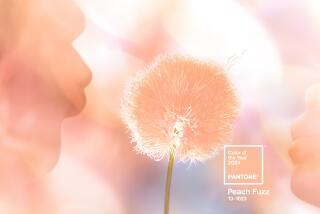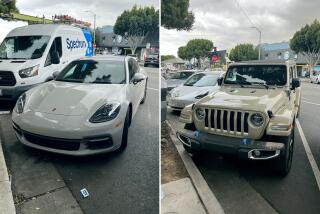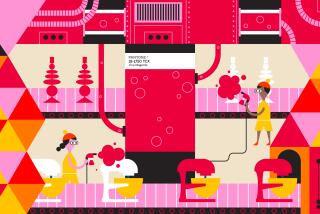Marsala, Pantone’s color of the year, has critics seeing red
What to make of Marsala, the Pantone color of the year for 2015? In interior design circles, its reception has been ... mixed.
“There’s not really a color that I hate, but now I have an exception,” says Los Angeles interior designer Kerry Joyce. “It’s a repellent version of cranberry, deeply unattractive, like cranberries with mildew, wine turned to vinegar. What were they thinking?”
According to the official statement from Pantone, which provides professional color standards for the design industries, Marsala “incorporates the satisfying richness of a tastefully fulfilling meal while its grounding red-brown roots point to a sophisticated, natural earthiness.” Apparently, not everyone got the memo.
“Sorry, Marsala, you couldn’t be more off track,” Los Angeles designer Christian May says. “No muddy tones, thank you.”
The brown undertone of Marsala also left some East Coast designers unimpressed. “This is certainly not a color that translates well into décor,” says David Scott, who is based in New York. “It brings me back to the days of the Pottery Barn slipcovered exaggerated roll arm sectional sofa covered in wine-colored cotton velvet.”
“I can see that people think it has a retro feel,” says Leatrice Eiseman, executive director of the Pantone Color Institute, the think tank that tracks color trends throughout the world. “It’s a color that has been around before, in the 1970s with avocado and harvest gold.” Nevertheless, manufacturers including Pottery Barn and coffee maker Keurig have shown little resistance to the color, and it does look rich in silk and velvet from Kravet fabrics.
“The Pantone color of the year is not a dictate,” Eiseman says, “but once it’s announced, we see that designers making goods that can be easily manufactured will hop on the bandwagon.” Indeed, in the days following the announcement, brand names hustled to present Marsala products to the press and the public.
“Bo Concept has already introduced a Lux Felt material in the Marsala tone, available on almost every upholstered piece of furniture from living and dining chairs to complete sofa lines,” says Kalina Todorova, the Danish firm’s global visual merchandiser manager.
Christos Joannides, founder of Flat 6 Concepts, a design and luxury goods branding firm, says retailers want to take advantage of the color “moment.” “But trend-dependent manufacturers who want to sell, sell, sell run the risk of diluting their brand if they attach themselves so quickly, without taking time to explore the color.”
And it is a challenging color.
“Marsala caught a lot of people off guard. It didn’t give people the feeling of bringing life and fun into your home. It felt older and muted,” says New Jersey architectural color consultant Amy Wax, the developer of an app called Color 911.
But Pantone’s Eiseman predicts that by the third quarter of 2015, “even the naysayers will have seen enough Marsala to try it if they see it used in an unusual way.” Beige, camel, brown and black are safe color companions, she advises. For a more avant-garde look, “reach across the color wheel to teal, turquoise, aqua peacock and cobalt blue.” She sees the color as particularly effective around food and wine: “In a dining room, it would be a smash.”
Even haters might agree, especially if they have trouble with red wine spills.


